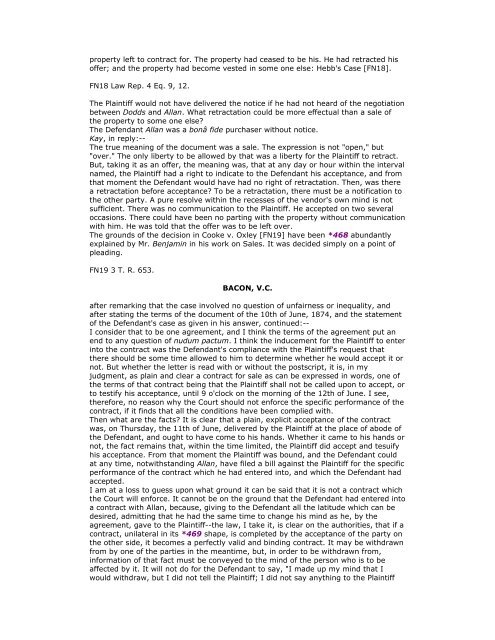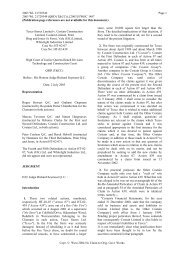Dickinson v Dodds - Thomson Reuters
Dickinson v Dodds - Thomson Reuters
Dickinson v Dodds - Thomson Reuters
Create successful ePaper yourself
Turn your PDF publications into a flip-book with our unique Google optimized e-Paper software.
property left to contract for. The property had ceased to be his. He had retracted hisoffer; and the property had become vested in some one else: Hebb's Case [FN18].FN18 Law Rep. 4 Eq. 9, 12.The Plaintiff would not have delivered the notice if he had not heard of the negotiationbetween <strong>Dodds</strong> and Allan. What retractation could be more effectual than a sale ofthe property to some one else?The Defendant Allan was a bonâ fide purchaser without notice.Kay, in reply:--The true meaning of the document was a sale. The expression is not "open," but"over." The only liberty to be allowed by that was a liberty for the Plaintiff to retract.But, taking it as an offer, the meaning was, that at any day or hour within the intervalnamed, the Plaintiff had a right to indicate to the Defendant his acceptance, and fromthat moment the Defendant would have had no right of retractation. Then, was therea retractation before acceptance? To be a retractation, there must be a notification tothe other party. A pure resolve within the recesses of the vendor's own mind is notsufficient. There was no communication to the Plaintiff. He accepted on two severaloccasions. There could have been no parting with the property without communicationwith him. He was told that the offer was to be left over.The grounds of the decision in Cooke v. Oxley [FN19] have been *468 abundantlyexplained by Mr. Benjamin in his work on Sales. It was decided simply on a point ofpleading.FN19 3 T. R. 653.BACON, V.C.after remarking that the case involved no question of unfairness or inequality, andafter stating the terms of the document of the 10th of June, 1874, and the statementof the Defendant's case as given in his answer, continued:--I consider that to be one agreement, and I think the terms of the agreement put anend to any question of nudum pactum. I think the inducement for the Plaintiff to enterinto the contract was the Defendant's compliance with the Plaintiff's request thatthere should be some time allowed to him to determine whether he would accept it ornot. But whether the letter is read with or without the postscript, it is, in myjudgment, as plain and clear a contract for sale as can be expressed in words, one ofthe terms of that contract being that the Plaintiff shall not be called upon to accept, orto testify his acceptance, until 9 o'clock on the morning of the 12th of June. I see,therefore, no reason why the Court should not enforce the specific performance of thecontract, if it finds that all the conditions have been complied with.Then what are the facts? It is clear that a plain, explicit acceptance of the contractwas, on Thursday, the 11th of June, delivered by the Plaintiff at the place of abode ofthe Defendant, and ought to have come to his hands. Whether it came to his hands ornot, the fact remains that, within the time limited, the Plaintiff did accept and tesuifyhis acceptance. From that moment the Plaintiff was bound, and the Defendant couldat any time, notwithstanding Allan, have filed a bill against the Plaintiff for the specificperformance of the contract which he had entered into, and which the Defendant hadaccepted.I am at a loss to guess upon what ground it can be said that it is not a contract whichthe Court will enforce. It cannot be on the ground that the Defendant had entered intoa contract with Allan, because, giving to the Defendant all the latitude which can bedesired, admitting that he had the same time to change his mind as he, by theagreement, gave to the Plaintiff--the law, I take it, is clear on the authorities, that if acontract, unilateral in its *469 shape, is completed by the acceptance of the party onthe other side, it becomes a perfectly valid and binding contract. It may be withdrawnfrom by one of the parties in the meantime, but, in order to be withdrawn from,information of that fact must be conveyed to the mind of the person who is to beaffected by it. It will not do for the Defendant to say, "I made up my mind that Iwould withdraw, but I did not tell the Plaintiff; I did not say anything to the Plaintiff
















